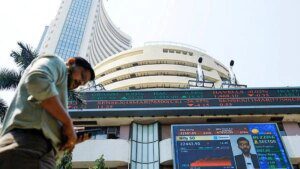Markets continued their downward trend for a second consecutive session on Monday, with the Nifty dipping below the significant 26,000 mark amid concerns about the weakening rupee and ongoing selling pressure affecting investor sentiment.
The benchmark Nifty concluded the day at 25,959.50, reflecting a decline of 108.65 points or 0.42 percent. Meanwhile, the Sensex fell by 331.21 points or 0.39 percent, finishing at 84,900.71. A sharp downturn was noted during the final half-hour of trading, erasing gains from a relatively stable session earlier, particularly with Tuesday’s monthly derivatives expiry on the horizon.
“After a range-bound positive session, the market closed with a decline in the last half hour, led by Monday expiry, as Nifty50 indices couldn’t hold above the key threshold of 26,000,” explained Vinod Nair, Head of Research at Geojit Investments Limited.
Throughout the session, the rupee remained under pressure, following a significant drop on Friday that brought it to record lows near 89.65 against the US dollar. “The rupee began the day with a strong gap-up at 89.20, gaining 0.35 rupees or 0.39 percent after Friday’s plunge to all-time lows near 89.65,” noted Jateen Trivedi, Vice President of Research at LKP Securities. Factors contributing to last week’s decline included delays in the India–US trade deal, a rising US dollar index, and a lack of visible intervention at lower levels.
Most sectoral indices closed lower, with Nifty Realty experiencing the most significant decline, plummeting over 2 percent. This sector has now recorded losses over five consecutive sessions, with a cumulative drop exceeding 5.5 percent. The only sectoral index that finished in the positive was Nifty IT.
In terms of individual stock performance, SBI Life was the top gainer on the Nifty, rising 2.60 percent to close at ₹2,075.00. It was followed by Tech Mahindra, which surged 2.42 percent to ₹1,496.80. Eicher Motors increased by 1.62 percent to ₹7,250.00, while Bajaj Auto grew by 1.38 percent to ₹9,015.00 and Wipro rose 1.21 percent to ₹247.44.
Conversely, Bharat Electronics faced a steep drop, plummeting 3.23 percent to ₹402.90. JSW Steel and Max Healthcare both declined by 2.37 percent, closing at ₹1,113.30 and ₹1,153.10, respectively. Grasim dropped 2.00 percent to ₹2,680.00, and Mahindra & Mahindra slipped 1.67 percent to ₹3,687.00.
“On the daily chart, the index has formed a large bearish candle, signaling sustained selling pressure and a lack of buying interest,” stated Sudeep Shah, Head – Technical and Derivatives Research at SBI Securities.
The broader market experienced heightened selling pressure as well. The Nifty Midcap 100 index fell by 0.32 percent, while the Nifty Smallcap 100 decreased by 0.85 percent, dropping below its 200-day exponential moving average. Of the 4,449 stocks traded on the BSE, 3,035 fell compared to 1,208 that advanced, with 359 stocks reaching 52-week lows against 93 hitting 52-week highs.
Gold prices opened weak, with a reduction of approximately ₹900 to ₹1,22,750, driven by a stronger rupee and softness in Comex gold near $4,045. Trivedi anticipates continued volatility for gold within a range of ₹1,21,500 to ₹1,25,000 on the MCX, with expectations of a Federal Reserve rate cut in December limiting downside risks.
Meanwhile, Bank Nifty closed slightly lower by 0.05 percent at 58,835.35. “Bank Nifty experienced strong bullish momentum during the first half but failed to sustain near the previous day’s high. In the last hour, the index faced a sharp correction, erasing early gains,” Shah remarked.
Looking forward, analysts anticipate increased volatility as the November series monthly futures and options expiry approaches on Tuesday. “We expect the Nifty to fluctuate within the 25,800 to 26,100 range,” advised Ajit Mishra of Religare Broking, urging participants to maintain a stock-specific approach and consider gradual accumulation of quality stocks.
Published on November 24, 2025










